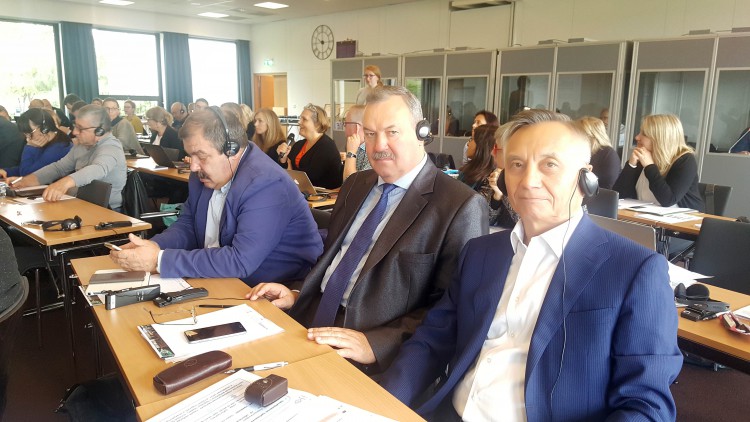Fair Wages: closing tax, social and pay gaps
Oleg Budza, CNSM President, and Tatiana Marian, President of the Youth Committee of the Pan-European Regional Council, attended in the period 18-20 September along with more than 45 colleagues from European and CIS countries the Summer School “Fair Wages: closing tax, social and pay gaps” organized by the Pan-European Regional Council in the Rönneberga Conference Center in Lidingo, Sweden.
According to Oleg Budza, the basic significance of this event is the fact that the most important issues the global trade union movement is facing have been addressed. However, he stressed that for the representatives of the CNSM it was particularly relevant to sign the Global Contract on the observance of the social dialogue at the highest level by colleagues from 16 countries, large trade union centers and their respective employers. The president of CNSM said that, when returning, he will inform the government, the employers’ organizations of the Republic of Moldova, about the existence and activity of a quite prestigious structure, which includes the countries that strictly follow the rules of the social dialogue and will be proposed to have high commitments in this respect.
Also, Oleg Budza stressed that for Moldovan trade unions it is very important that as many articles of the Labour Code of the Republic of Moldova were amended, Swedish colleagues expressed their support for the CNSM, advocating for development, respect, continuous promotion of social dialogue, conclusion of collective labour contracts. Exactly these principles are rigorously appreciated in this country during the last 40-50 years. Moreover, colleagues from that Scandinavian country believe that in areas where a small number of collective labour contracts are concluded, there is a low effectiveness of trade union organizations. “We agree with this conclusion, said Oleg Budza, that is why we will hold a meeting of the Confederal Committee, in which we will discuss this issue, because we have to admit that not always labour contracts are elaborated, designed in a perfect form, registered with the Labour Inspectorate.”
Tatiana Marian declared, “There is discrimination in the European and Pan-European labour market, especially for vulnerable categories, such as young people under 25, women and people with special needs. This situation alarms us, because inequality in employment and decent work, low wages and gender discrimination are driving unemployment, the lack of decent work and migration among young people. Therefore, the Youth Committee of the Pan-European Regional Council continues to contribute to the Global Agenda 2030, notably SDG 8 “Decent Work and Economic Growth”, supporting the Common Minimum Wage Strategy, motivating and facilitating young people to engage proactively in regional and national trade union activities, adopt positive measures to increase youth representativeness in decision-making processes at all levels. Taking into account that young people are a vulnerable category in terms of access to the labour market, which is confronted with various aspects of employment and discrimination, as well as to alleviate this scourge, I consider that Pan-European level trade union structures need to implement the “PAY RISE” campaign by carry out the European Trade Union Confederation.”
Another major issue that was addressed at the Summer School was high wages. Thus, Swedish colleagues believe that high wages must not scare anyone, they do not generate losses for companies that pay generous wages and show real competition between companies. On the contrary, they oppose small wages. Moreover, Swedish trade unions strongly support the fact that companies, which do not pay the minimum wages negotiated by the government, employers and trade unions, will be liquidated and employees will be offered jobs in other companies. For the trade unions from Moldova such requirements have an innovative character. Usually, we tend to keep an enterprise at all costs. On the other hand, in Sweden there is a radical approach from this perspective, because in this country it is considered that the low salary does not bring wealth to the employee and his family.
Finally, Oleg Budza noted that many aspects of the cooperation between employers, trade unions and the government of Sweden, which, as we know, are socially oriented.
For more information contact: Department of Mass Media and International Relations,
(022) 266590 or press@cnsm.md



